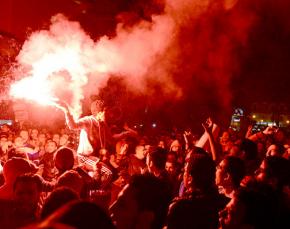Egypt’s revolutionary tides
On January 25, left-wing activists trying to commemorate the third anniversary of the Egyptian Revolution by mobilizing to Cairo's Tahrir Square were overwhelmed by supporters of the military dictatorship headed by Gen. Abdul-Fattah el-Sisi.
A week and a half earlier, Egyptians went to the polls and approved a new constitution in a vote that was widely seen as a referendum on Sisi's leadership. The vote followed a months-long offensive by the regime against those protesting the ouster of Muslim Brotherhood President Mohamed Morsi, who was removed from power by the military on July 3. Thousands of people have been killed since July, mostly supporters of the Muslim Brotherhood. Meanwhile, the military has reintroduced laws requiring prior permission to hold protests--essentially criminalizing dissent of any kind.
In this climate, those who defend what the revolutionary movement fought for three years ago are faced with the challenge of how to make sense of an upsurge in popular support for the military government, which has carried out the same kind of state repression characteristic of the regime of Hosni Mubarak that was overthrown three years ago.
The day after left-wing activists attempted to commemorate the third anniversary of the revolution, the addressed this open letter to the many Egyptian revolutionaries who still yearn for fundamental change.
GREETING TO the comrades and colleagues among the revolutionaries who came onto the streets yesterday. Their presence and their bravery in facing the security forces in the midst of the mobilization for Gen. el-Sisi were of the utmost importance.
It is natural that there will be feelings of frustration because we were not able to enter Tahrir Square, and because the regime's supporters were able to take control.
However, our goal was not to occupy the square, but to develop a third alternative on the political scene--an alternative which can gather around it the tens of thousands who did not take part in the referendum [on the constitution] and rejected this farce, a posture which terrifies the counterrevolution.
Our presence in the streets marks the beginning of such a task. Imagine if the day had passed with celebrations that were only challenged by Islamist demonstrations against the military. Then, certainly the sense of frustration would be stronger. Today, in spite of the darkness and oppression, we are charting a new course, and there are many who are anticipating that this will be a battle where we need to take a deep breath.

So greetings to the comrades who defied fear and repression, and proved that there are revolutionary forces determined to take action. We need, however, tactics appropriate to the current political moment.
This day should not be compared with the day of the revolution in 2011, but with July 26, 2013, when el-Sisi called for a "mandate" from the people. There is a difference, certainly, even among the large sections of the masses who did not come out into the streets yesterday. Yes, martyrs fell, and hundreds were arrested, but we have to grasp that freedom and resistance to the counterrevolution will require sacrifices that must be calculated and subject to evaluation.
There are opportunist forces, which do not want to move at all, either because they are allied with the military or because they believe that we have no stake in the current political struggle. They believe that, after the victory of the counterrevolution and the complete return of the security state, they will be able to challenge the regime and only need to wait for the elimination of the Muslim Brotherhood.
This logic, in addition to being supremely opportunistic because it turns a blind eye to the massacres occurring on a daily basis, is also completely wrong, because if the new regime is consolidated without resistance, it will eliminate revolutionaries, workers and students.
COMRADES, WE know that great popular revolutions are like the tides of the sea: they ebb and flow, with victories and defeats, and with continuous battles from the first moment between the forces of revolution and counterrevolution. And at every moment, the appropriate revolutionary tactics will be different.
The phase of el-Sisi's rule is clearly a period of counterrevolutionary offensive. The military, the police, Mubarak's cronies and opportunist forces are in control. Yet el-Sisi's regime can only continue on the basis of killing, repression, incitement and distortion against the revolution and revolutionaries.
Despite the fact that its base of support has relatively decreased, it does enjoy positive backing from some sections, mostly artisans, workers from small workshops and street vendors, as well as sections of the middle class who are desperate for "stability" and who have "had enough of the revolution," in addition to the old ruling party's network of interests. More importantly, wide sections of the masses have been demoralized and are looking for a savior.
At this stage, therefore, we have to focus on cumulative work among students, workers and the popular masses, who will gradually discover the false nature of el-Sisi's claims and by degrees turn against him. We should not leap too far ahead of their consciousness, but link their issues and demands to the political situation and the actions of the regime. We must study revolutions and arm ourselves with the scientific education of revolutionary Marxism.
We must take all these steps in the face of counterrevolution--and not expose ourselves in a suicidal fashion. Our victory will be of real value when we can win tens of thousands to our ranks.
Once again, greetings to you, comrades, colleagues and revolutionaries.
The Political Bureau of the Revolutionary Socialists
January 26, 2014
First published at the Revolutionary Socialists' website.


